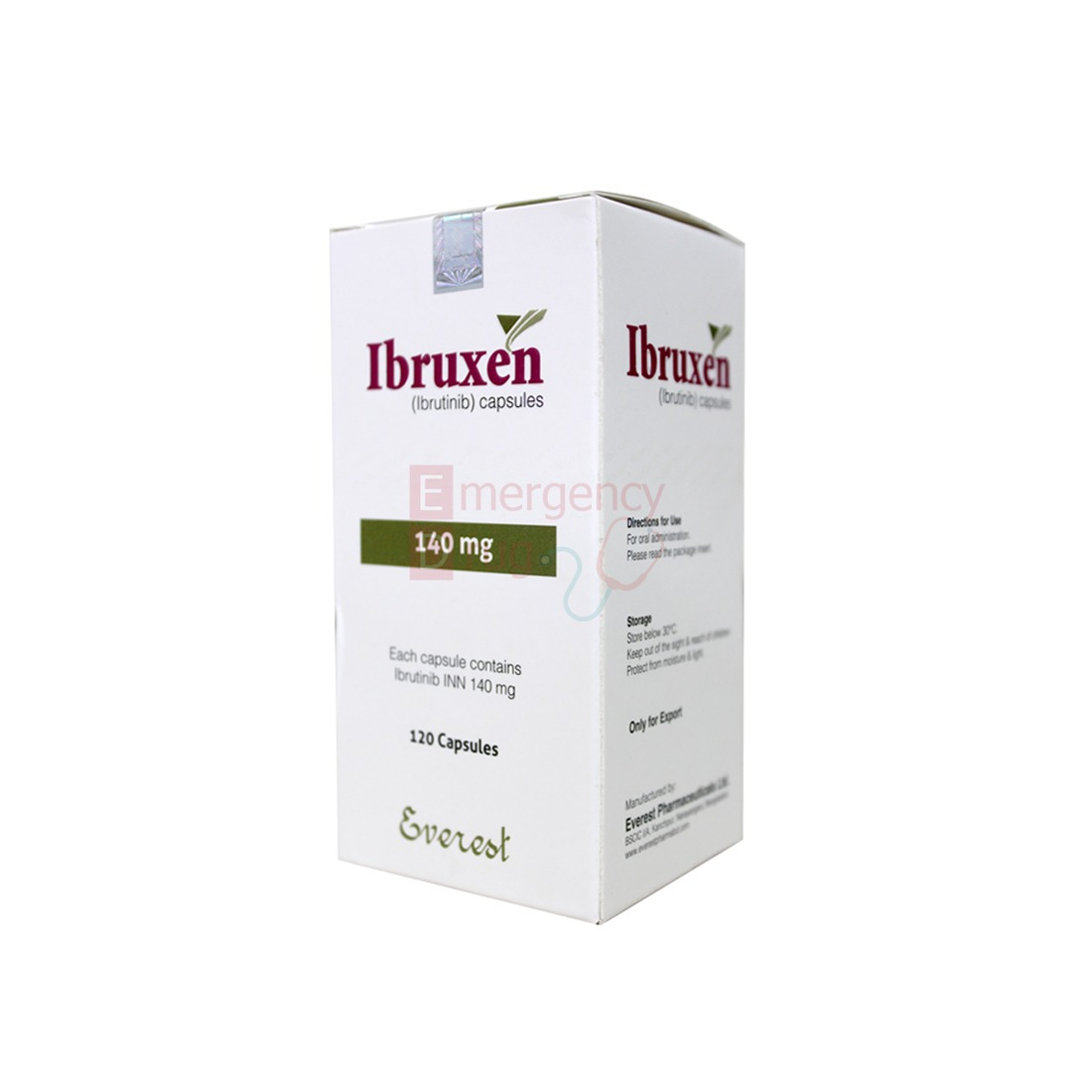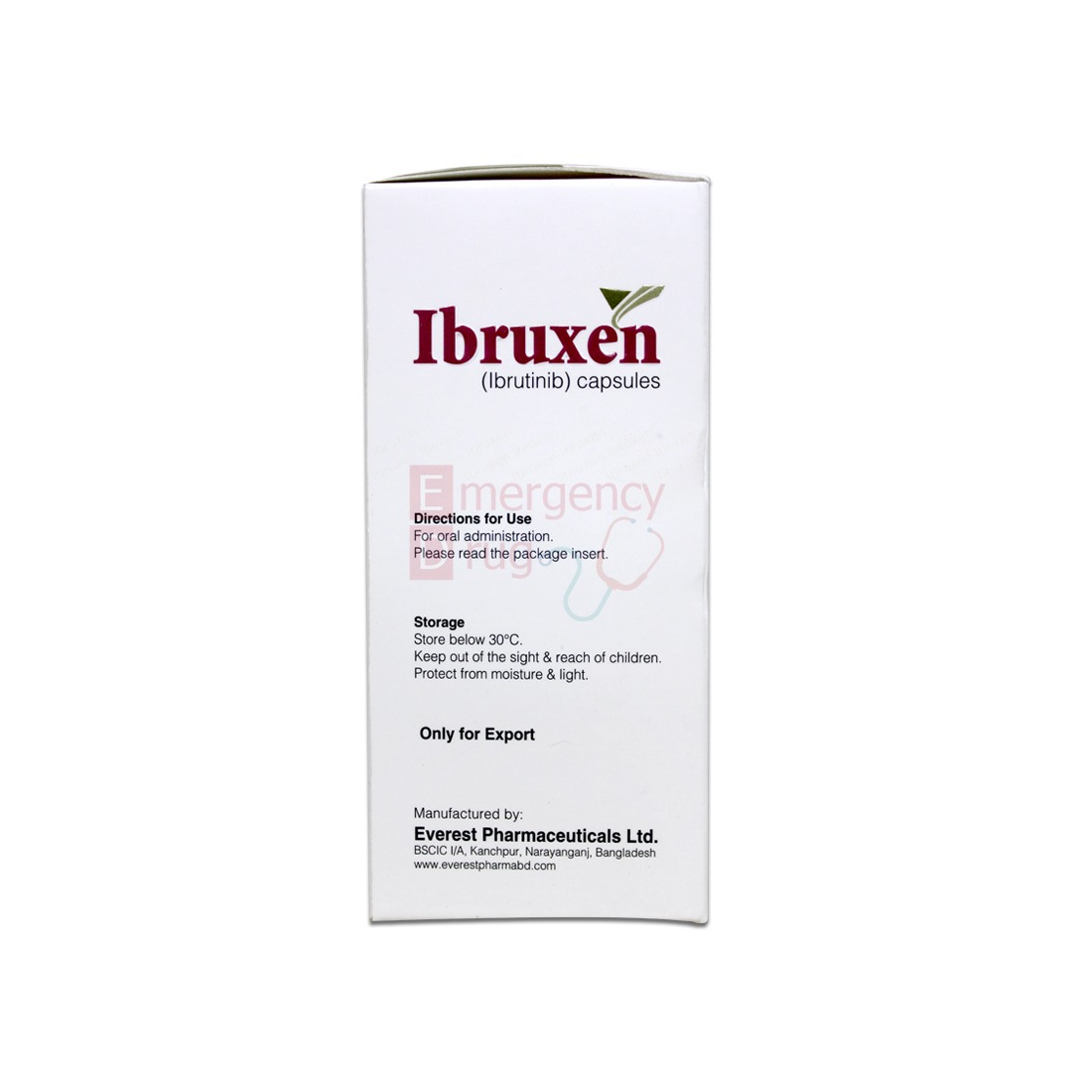Description
Ibruxen 140 Mg
Ibruxen (Ibrutinib) 140 mg is a generic drug used in the treatment of certain types of blood cancer, including chronic lymphocytic leukemia (CLL) and mantle cell lymphoma (MCL). It works by blocking the activity of an enzyme called Bruton’s tyrosine kinase (BTK), which helps cancer cells grow and divide. Ibrutinib is available in pill form and is taken orally. Common side effects include fatigue, diarrhea, muscle and joint pain, and an increased risk of infection. Patients should talk to their doctor about the benefits and risks of taking ibrutinib and how it may affect their individual health situation.
Product Features of Ibruxen 140 Mg:
| Product Name | : Ibruxen |
| Generic Name | : Ibrutinib |
| Manufacturer | : Everest Pharma Ltd |
| Indication | : Blood Cancer |
| Formulation | : Capsule |
| Strength | : 140 mg |
| Quantity | : 120 Capsules |
| Storage | : Room temperature |
| Registrations | : Export Only |
Indications
Mantle Cell Lymphoma: Ibruxen indicate for the treatment of patients with Mantle Cell Lymphoma (MCL) who have received at least one prior therapy. Chronic Lymphocytic Leukemia/Small Lymphocytic Lymphoma: That indicate for the treatment of patients with chronic lymphocytic leukemia. Chronic Lymphocytic Leukemia/Small Lymphocytic Lymphoma with 17p deletion Ibrutinib is indicated for the treatment of patients with chronic lymphocytic leukemia.
Waldenstrom Macroglobulinemia (WM): Ibrutinib indicate for the treatment of patients with Waldenstrom Macroglobulinemia (WM). Marginal Zone Lymphoma: Indicate for the treatment of patients with marginal zone lymphoma (MZL) who require systemic therapy and have received at least one prior anti-CD 20-based therapy.
Mantle Cell Lymphoma and Marginal Zone Lymphoma: The recommended dose of Ibrutinib for MCL and MZL is 560 mg (four 140 mg capsules) orally once daily until disease progression or unacceptable toxicity.
Chronic Lymphocytic Leukemia/Small Lymphocytic Lymphoma and Waldenstrom Macroglobulinemia (WM): The recommended dose of Ibrutinib for CLL/SLL and WM is 420 mg (three 140 mg capsules) orally once daily until disease progression or unacceptable toxicity. The recommended dose of Ibrutinib for CLL/SLL when use in combination with bendamustine and rituximab (administered every 28 days for up to 6 cycles) is 420 mg (three 140 mg capsules) orally once daily until disease progression or unacceptable toxicity.
Administration
Administer Ibruxen 140 mg orally once daily at approximately the same time each day. Swallow the capsules whole with water. Do not open, break, or chew the capsules.
Interaction
CYP3A Inhibitors: Co-administration with strong and moderate CYP3A inhibitors should avoid. If a moderate CYP3A inhibitor must be used, Ibrutinib dose should reduce.
CYP3A Inducers: Co-administration with strong CYP3A inducers should avoid.
Contraindications
Hypersensitivity to the active substance or to any of the excipients.
Side Effects of Ibrutinib 140 mg
The following adverse reactions discuss in more detail in other sections of the labeling: Hemorrhage, Infections, Cytopenias, Atrial Fibrillation, Hypertension, Second Primary Malignancies and Tumor Lysis Syndrome. Additional Important Adverse Reactions: Diarrhea, Visual Disturbance.
Pregnancy & Lactation
Pregnancy: Ibruxen, a kinase inhibitor, can cause fetal harm based on findings from animal studies. In animal reproduction studies, administration of Ibrutinib to pregnant rats and rabbits during the period of organogenesis at exposures up to 2-20 times the clinical doses of 420-560 mg daily produced embryofetal toxicity including malformations. If Ibrutinib use during pregnancy or if the patient becomes pregnant while taking Ibrutinib, the patient should apprise of the potential hazard to the fetus. The estimated background risk of major birth defects and miscarriage for the indicated population is unknown.
Lactation: There is no information regarding the presence of Ibrutinib or its metabolites in human milk, the effects on the breast fed infant, or the effects on milk production.
Use in Special Populations
Pediatric Use: The safety and effectiveness of Ibrutinib in pediatric patients has not established.
Geriatric Use: Of the 905 patients in clinical studies of Ibrutinib, 62% were ≥ 65 years of age, while 21% were ≥75 years of age. No overall differences in effectiveness observe between younger and older patients. Anemia (all grades) and Grade 3 or higher pneumonia occur more frequently among older patients treated with Ibrutinib.
Hepatic Impairment: Ibruxen 140 mg metabolize in the liver. In a hepatic impairment study, data show an increase in Ibrutinib exposure. The safety of Ibrutinib has not evaluated in cancer patients with mild to severe hepatic impairment by Child-Pugh criteria. Monitor patients for signs of Ibrutinib toxicity and follow dose modification guidance as needed. It is not recommended to administer Ibrutinib to patients with moderate or severe hepatic impairment.
Overdose Effects of Ibrutinib 140 mg
There is no specific experience in the management of Ibrutinib over dose in patients. One healthy subject experienced reversible Grade 4 hepatic enzyme increases (AST and ALT) after a dose of 1680 mg. Closely monitor patients who ingest more than the recommended dosage and provide appropriate supportive treatment.
Storage Conditions
Store in a dry place below 30°C, protect from light. Keep out of the reach of children.
For more Oncology medicine, visit our SHOP













Reviews
There are no reviews yet.